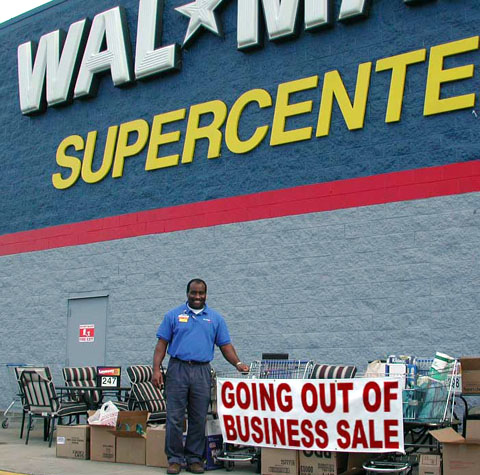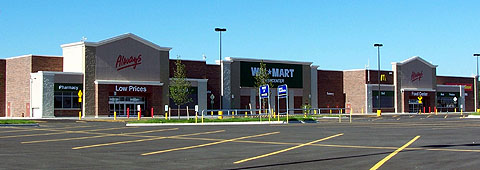by David Ward on 12 Spetmeber 2007
Yesterday, 9/11/07, The beast from Bentonville lost in their efforts to supersize their Lihue store. They lost because their efforts were revealed to be nothing more than smoke, mirrors and bad math. The Planning Department and few citizen watchdogs came through for Kauai in exposing their efforts to use loopholes that they had dreamed up. Many thanks to those involved especially those watchdogs that are always
there for Kauai. See interesting artilce on Wal-Wart below.
The beast from Bentonville
in www.JimHightower.com
Wal-Mart is now the world’s biggest corporation, having passed ExxonMobil for the top slot. It hauls off a stunning $220 billion a year from We the People (more in revenues than the entire GDP of Israel and Ireland combined).
Wal-Mart cultivates an aw-shucks, we’re-just-folks-from-Arkansas image of neighborly small-town shopkeepers trying to sell stuff cheaply to you and yours. Behind its soft homespun ads, however, is what one union leader calls "this devouring beast" of a corporation that ruthlessly stomps on workers, neighborhoods, competitors, and suppliers.
Despite its claim that it slashes profits to the bone in order to deliver "Always Low Prices," Wal-Mart banks about $7 billion a year in profits, ranking it among the most profitable entities on the planet.
Of the ten richest people in the world, five are Waltons—the ruling family of the Wal-Mart empire. S. Robson Walton is ranked by London’s "Rich List 2001" as the wealthiest human on the planet, having sacked up more than $65 billion in personal wealth and topping Bill Gates as Number One.
Wal-Mart and the Waltons got to the top the old-fashioned way—by roughing people up. The corporate ethos emanating from the Bentonville headquarters dictates two guiding principles for all managers: extract the very last penny possible from human toil, and squeeze the last dime from every supplier.
With more than one million employees (three times more than General Motors), this far-flung retailer is the country’s largest private employer, and it intends to remake the image of the American workplace in its image—which is not pretty.
Yes, there is the happy-faced "greeter" who welcomes shoppers into every store, and employees (or "associates," as the company grandiosely calls them) gather just before opening each morning for a pep rally, where they are all required to join in the Wal-Mart cheer: "Gimme a ‘W!’" shouts the cheerleader; "W!" the dutiful employees respond. "Gimme an A!’" And so on.
Behind this manufactured cheerfulness, however, is the fact that the average employee makes only $15,000 a year for full-time work. Most are denied even this poverty income, for they’re held to part-time work. While the company brags that 70% of its workers are full-time, at Wal-Mart "full time" is 28 hours a week, meaning they gross less than $11,000 a year.
Health-care benefits? Only if you’ve been there two years; then the plan hits you with such huge premiums that few can afford it—only 38% of Wal-Marters are covered.
Thinking union? Get outta here! "Wal-Mart is opposed to unionization," reads a company guidebook for supervisors. "You, as a manager, are expected to support the company’s position. . . . This may mean walking a tightrope between legitimate campaigning and improper conduct."
Wal-Mart is in fact rabidly anti-union, deploying teams of union-busters from Bentonville to any spot where there’s a whisper of organizing activity. "While unions might be appropriate for other companies, they have no place at Wal-Mart," a spokeswoman told a Texas Observer reporter who was covering an NLRB hearing on the company’s manhandling of 11 meat-cutters who worked at a Wal-Mart Supercenter in Jacksonville, Texas.
These derring-do employees were sick of working harder and longer for the same low pay. "We signed [union] cards, and all hell broke loose," says Sidney Smith, one of the Jacksonville meat-cutters who established the first-ever Wal-Mart union in the U.S., voting in February 2000 to join the United Food and Commercial Workers. Eleven days later, Wal-Mart announced that it was closing the meat-cutting departments in all of its stores and would henceforth
buy prepackaged meat elsewhere.
But the repressive company didn’t stop there. As the Observer reports: "Smith was fired for theft—after a manager agreed to let him buy a box of overripe bananas for 50 cents, Smith ate one banana before paying for the box, and was judged to have stolen that banana."
Wal-Mart is an unrepentant and recidivist violator of employee rights, drawing repeated convictions, fines, and the ire of judges from coast to coast. For example, the Equal Employment Opportunity Commission has had to file more suits against the Bentonville billionaires club for cases of disability discrimination than any other corporation. A top EEOC lawyer told Business Week, "I have never seen this kind of blatant disregard for the law."
Likewise, a national class-action suit reveals an astonishing pattern of sexual discrimination at Wal-Mart (where 72% of the salespeople are women), charging that there is "a harsh, anti-woman culture in which complaints go unanswered and the women who make them are targeted for retaliation."
Workers’ compensation laws, child-labor laws (1,400 violations in Maine alone), surveillance of employees—you name it, this corporation is a repeat offender. No wonder, then, that turnover in the stores is above 50% a year, with many stores having to replace 100% of their employees each year, and some reaching as high as a 300% turnover!
Then there’s China. For years, Wal-Mart saturated the airwaves with a "We Buy American" advertising campaign, but it was nothing more than a red-white-and-blue sham. All along, the vast majority of the products it sold were from cheap-labor hell-holes, especially China. In 1998, after several exposes of this sham, the company finally dropped its "patriotism" posture and by 2001 had even moved its worldwide purchasing headquarters to China.
Today, it is the largest importer of Chinese-made products in the world, buying $10 billion worth of merchandise from several thousand Chinese factories.
As Charlie Kernaghan of the National Labor Committee reports, "In country after country, factories that produce for Wal-Mart are the worst," adding that the bottom-feeding labor policy of this one corporation "is actually lowering standards in China, slashing wages and benefits, imposing long mandatory-overtime shifts, while tolerating the arbitrary firing of workers who even dare to discuss factory conditions."
Wal-Mart does not want the U.S. buying public to know that its famous low prices are the product of human misery, so while it loudly proclaims that its global suppliers must comply with a corporate "code of conduct" to treat workers decently, it strictly prohibits the disclosure of any factory names and addresses, hoping to keep independent sources from witnessing the "code" in operation.
Kernaghan’s NLC, acclaimed for its fact-packed reports on global working conditions, found several Chinese factories that make the toys Americans buy for their children at Wal-Mart. Seventy-one percent of the toys sold in the U.S. come from China, and Wal-Mart now sells one out of five of the toys we buy.
NLC interviewed workers in China’s Guangdong Province who toil in factories making popular action figures, dolls, and other toys sold at Wal-Mart. In "Toys of Misery," a shocking 58-page report that the establishment media ignored, NLC describes:
• 13-hour to 16-hour days molding, assembling, and spray-painting toys—8:00am to 9:00pm, or even midnight, seven days a week, with 20-hour shifts in peak season.
• Even though China’s minimum wage is 31 cents an hour—which doesn’t begin to cover a person’s basic subsistence-level needs—these production workers are paid 13 cents an hour.
• Workers typically live in squatter shacks, seven feet by seven feet, or jammed in company dorms, with more than a dozen sharing a cubicle costing $1.95 a week for rent. They pay about $5.50 a week for lousy food. They also must pay for their own medical treatment and are fired if they are too ill to work.
• The work is literally sickening, since there’s no health and safety enforcement. Workers have constant headaches and nausea from paint-dust hanging in the air; the indoor temperature tops 100 degrees; protective clothing is a joke; repetitive stress disorders are rampant; and there’s no training on the health hazards of handling the plastics, glue, paint thinners, and other solvents in which these workers are immersed every day.
As for Wal-Mart’s highly vaunted "code of conduct," NLC could not find a single worker who had ever seen or heard of it.
These factories employ mostly young women and teenage girls. Wal-Mart, renowned for knowing every detail of its global business operations and for calculating every penny of a product’s cost, knows what goes on inside these places. Yet, when confronted with these facts, corporate honchos claim ignorance and wash their hands of the exploitation: "There will always be people who break the law," says CEO Lee Scott. "It is an issue of human greed
among a few people."
Those "few people" include him, other top managers, and the Walton billionaires. Each of them not only knows about their company’s exploitation, but willingly prospers from a corporate culture that demands it. "Get costs down" is Wal-Mart’s mantra and modus operandi, and that translates into a crusade to stamp down the folks who produce its goods and services, shamelessly building its low-price strategy and profits on their backs.
Worse, Wal-Mart is on a messianic mission to extend its exploitative ethos to the entire business world. More than 65,000 companies supply the retailer with the stuff on its shelves, and it constantly hammers each supplier about cutting their production costs deeper and deeper in order to get cheaper wholesale prices. Some companies have to open their books so Bentonville executives can red-pencil what CEO Scott terms "unnecessary costs.
"
Of course, among the unnecessaries to him are the use of union labor and producing goods in America, and Scott is unabashed about pointing in the direction of China or other places for abysmally low production costs. He doesn’t even have to say "Move to China"—his purchasing executives demand such an impossible lowball price from suppliers that they can only meet it if they follow Wal-Mart’s labor example. With its dominance over its
own 1.2 million workers and 65,000 suppliers, plus its alliances with ruthless labor abusers abroad, this one company is the world’s most powerful private force for lowering labor standards and stifling the middle-class aspirations of workers everywhere.
Using its sheer size, market clout, access to capital, and massive advertising budget, the company also is squeezing out competitors and forcing its remaining rivals to adopt its price-is-everything approach.
Even the big boys like Toys R Us and Kroger are daunted by the company’s brutish power, saying they’re compelled to slash wages and search the globe for sweatshop suppliers in order to compete in the downward race to match Wal-Mart’s prices.
How high a price are we willing to pay for Wal-Mart’s "low-price" model? This outfit operates with an avarice, arrogance, and ambition that would make Enron blush. It hits a town or city neighborhood like a retailing neutron bomb, sucking out the economic vitality and all of the local character. And Wal-Mart’s stores now have more kill-power than ever, with its Supercenters averaging 200,000 square feet—the size of more than four football
fields under one roof! These things land splat on top of any community’s sense of itself and devour local business.
By slashing its retail prices way below cost when it enters a community, Wal-Mart can crush our groceries, pharmacies, hardware stores, and other retailers, then raise its prices once it has monopoly control over the market.
But, say apologists for these Big-Box megastores, at least they’re creating jobs. Wrong. By crushing local businesses, this giant eliminates three decent jobs for every two Wal-Mart jobs that it creates—and a store full of part-time, poorly paid employees hardly builds the family wealth necessary to sustain a community’s middle-class living standard.
Indeed, Wal-Mart operates as a massive wealth extractor. Instead of profits staying in town to be reinvested locally, the money is hauled off to Bentonville, either to be used as capital for conquering yet another town or simply to be stashed in the family vaults (the Waltons, by the way, just bought the biggest bank in Arkansas).
Why should we accept this? Is it our country, our communities, our economic destinies—or theirs? Wal-Mart’s radical remaking of our labor standards and our local economies is occurring mostly without our knowledge or consent. Poof—there goes another local business. Poof—there goes our middle-class wages. Poof—there goes another factory to China. No one voted for this . . . but there it is. While corporate ideologues might huffily assert
that customers vote with their dollars, it’s an election without a campaign, conveniently ignoring that the public’s "vote" might change if we knew the real cost of Wal-Mart’s "cheap" goods—and if we actually had a chance to vote.
Much to the corporation’s consternation, more and more communities are learning about this voracious powerhouse, and there’s a rising civic rebellion against it. Tremendous victories have already been won as citizens from Maine to Arizona, from the Puget Sound to the Gulf of Mexico, have organized locally and even statewide to thwart the expansionist march of the Wal-Mart juggernaut.
Wal-Mart is huge, but it can be brought to heel by an aroused and organized citizenry willing to confront it in their communities, the workplace, the marketplace, the classrooms, the pulpits, the legislatures, and the voting booths. Just as the Founders rose up against the mighty British trading companies, so we can reassert our people’s sovereignty and our democratic principles over the autocratic ambitions of mighty Wal-Mart.
|



